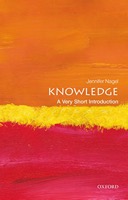Knowledge: A Very Short Introduction
Oxford University Press, 2014
Available here.

Articles, book chapters, and commentaries:
"Reflection, Confabulation, and Reasoning", forthcoming in Kornblith and his Critics, Joshua DiPaolo and Luis Oliveira, eds. Wiley-Blackwell.
"Natural Curiosity", forthcoming in Putting Knowledge to Work: New Direction for Knowledge-First Epistemology, Arturs Logins and Jacques-Henri Vollet, eds. Oxford University Press.
"Seeking Safety in Knowledge", Proceedings and Addresses of the American Philosophical Association 97 (2023), 186-214.
"New Frontiers in Epistemic Evaluation: Lackey on the epistemology of groups", Res Philosophica 100:3 (2023), 405-413.
"Responding to how things seem: Bergmann on skepticism and intuition" Analysis 82:4 (2022), 697-709.
"The Distinctive Character of Knowledge", Behavioral and Brain Sciences 44 (2021), 47-48.
"Mindreading in Conversation" (with Evan Westra), Cognition 210 (2021), 1-15.
“Losing Knowledge by Thinking about Thinking”, in Reasons, Justification and Defeat, Jessica Brown and Mona Simion, eds. Oxford University Press, 2021, 69-92.
“The Psychological Dimension of the Lottery Paradox”, in Lotteries, Knowledge and Rational Belief: Essays on the Lottery Paradox, Igor Douven, ed., Cambridge University Press, 2021, 48-73.
“The Psychology of Epistemic Judgement” (with Jessica Wright), in the Routledge Companion to the Philosophy of Psychology, John Symons, Paco Calvo and Sarah Robins, eds. New York: Routledge, 2019, 746-765.
“Epistemic Territory”, Proceedings and Addresses of the American Philosophical Association 93 (2019), 67-86.
“Classical Indian Skepticism: Reforming or Rejecting Philosophy?” Comparative Philosophy 10:2 (2019), 113-118.
“Epistemic authority, episodic memory, and the sense of self”, Behavioral and Brain Sciences, 2018 35-36.
“The Psychological Context of Contextualism” (with Julia Jael Smith), in the Routledge Handbook to Contextualism, Jonathan Ichikawa, ed. New York: Routledge, 2017 94-104.
“Factive and non-factive mental state attribution” Mind & Language 32 (2017), 525-544
Knowledge and Reliability, in Alvin Goldman and his Critics, ed. Hilary Kornblith and Brian McLaughlin. Malden, MA: Wiley-Blackwell, 2016, 237-256.
“Armchair-Friendly Experimental Philosophy” (with Kaija Mortensen), in A Companion to Experimental Philosophy, Justin Sytsma and Wesley Buckwalter, eds. Malden, MA: Wiley-Blackwell, 2016, 53-70.
“The Social Value of Reasoning”, Episteme 12:2, 297-308.
Sensitive Knowledge: Locke on Skepticism and Sensation, in the Blackwell Companion to Locke, ed. Matthew Stuart. Malden, MA: Blackwell, 2015, 313-333.
“The Meanings of Metacognition”, Philosophy and Phenomenological Research 89:3, 710-718.
“Intuition, Reflection, and the Command of Knowledge”, Proceedings of the Aristotelian Society, Supplementary Volume 88 (2014), 217-39.
The Reliability of Epistemic Intuitions (with Kenneth Boyd), in Current Controversies in Experimental Philosophy, ed. Edouard Machery and Elizabeth O’Neill (Routledge, 2014).
Authentic Gettier Cases: A reply to Starmans and Friedman (with Valerie San Juan and Raymond A. Mar), Cognition 129 (2013), 666-669.
Lay Denial of Knowledge for Justified True Beliefs (with Valerie San Juan and Raymond A. Mar), Cognition 129 (2013), 652-661.
Defending the Evidential Value of Epistemic Intuitions: A Reply to Stich, Philosophy and Phenomenological Research 86:1 (July 2013), 179-199.
Knowledge as a Mental State, Oxford Studies in Epistemology 4 (May 2013), 273-308. (or here)
Motivating Williamson’s Model Gettier Cases, Inquiry 56:1 (April 2013), 54-62, (or here).
Intuitions and Experiments: A Defense of the Case Method in Epistemology, Philosophy and Phenomenological Research 85:3 (November 2012).
Mindreading in Gettier Cases and Sceptical Pressure Cases, in Knowledge Ascriptions, Jessica Brown and Mikkel Gerken, eds. (Oxford University Press, 2012), 171-191.
The Psychological Basis of the Harman-Vogel Paradox, Philosophers’ Imprint 11:5 (March 2011), 1-28.
Epistemic Anxiety and Adaptive Invariantism, Philosophical Perspectives 24 (December 2010), 407-435. Penultimate draft here,
Knowledge Ascriptions and the Psychological Consequences of Thinking about Error, Philosophical Quarterly 60: 239 (April 2010): 286-306 (or here).
Knowledge Ascriptions and the Psychological Consequences of Changing Stakes, Australasian Journal of Philosophy 86 (June 2008): 279-294. (or here)
Epistemic Intuitions Philosophy Compass 2/6 (2007): 792–819. Or here.
Contemporary Scepticism and the Cartesian God, Canadian Journal of Philosophy (September 2005), 465-497.
The Empiricist Conception of Experience, Philosophy 75 (July 2000), 345-376.
Reviews, encyclopedia entries and conference proceedings:
Review of Hilary Kornblith, Second Thoughts and the Epistemological Enterprise, NDPR April 2020
Gendler on Alief. Contribution to book symposium on Tamar Gendler’s Intuition, Imagination and Philosophical Methodology, Analysis Reviews 72:4, 774-788.
The Attitude of Knowledge. Contribution to book symposium on Keith DeRose’s The Case for Contextualism, Vol. 1, Philosophy and Phenomenological Research 84:3 (2012), 678-685.
Broadly Kantian Epistemology and the Problem of Mind-Independence Proceedings of the X International Kant Congress (Berlin, DeGruyter 2008), 699-709.
Review of Albert Casullo, A Priori Knowledge The Philosophical Review (April 2006) 115:2, 251-255.
Empiricism encyclopedia entry for The Philosophy of Science: An Encyclopedia, Sarkar and Pfeifer, eds. (Routledge, 2006), 235-243.
Review of Joel Pust, Intuitions as Evidence Philosophy in Review (August 2001), 282-285.
Review of Cudworth, A Treatise Concerning Eternal and Immutability Reality, ed. Sarah Hutton. Philosophy in Review (February 1998), 19-21.